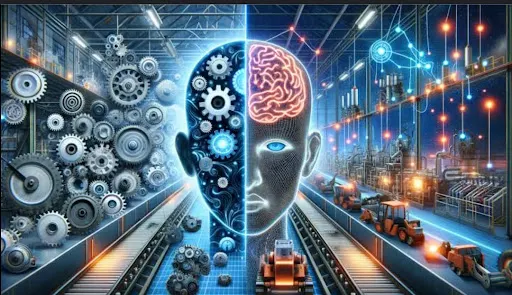- Get link
- X
- Other Apps
- Get link
- X
- Other Apps
In the ever-evolving landscape of technology, artificial intelligence (AI) and automation are not just buzzwords—they’re revolutionizing how we work and live. From transforming industries to altering daily routines, these technologies are reshaping our world in profound ways. But how exactly are they doing this, and what does it mean for us?
1. The AI-Powered Workplace: Efficiency Meets Innovation
Imagine walking into your office and finding that AI-driven systems have already sorted your emails, scheduled your meetings, and even suggested the best times for focused work. This is no longer a futuristic dream but a growing reality in many workplaces.
How AI is Changing the Game:
- Smart Assistants: Tools like chatbots and virtual assistants handle routine inquiries, freeing up human employees for more complex tasks.
- Predictive Analytics: AI analyzes data to predict trends, helping businesses make informed decisions and stay ahead of the curve.
- Automated Processes: Repetitive tasks such as data entry or inventory management are increasingly automated, improving efficiency and reducing errors.
These innovations are making workplaces more productive and allowing employees to focus on creative and strategic work, driving both individual and organizational growth.
2. The Rise of Automation: From Manufacturing to Service Industries
Automation is not limited to manufacturing; it’s making waves across various sectors, including services and retail. Think of automated checkout systems, robotic process automation (RPA) in finance, and even AI-driven customer service.
Notable Automation Trends:
- Retail: Self-checkout kiosks and automated inventory systems are streamlining shopping experiences and store management.
- Finance: RPA handles tasks like transaction processing and compliance checks, reducing human error and speeding up operations.
- Healthcare: AI-powered diagnostic tools assist doctors in identifying conditions more accurately and quickly.
These advancements are increasing efficiency, reducing operational costs, and often enhancing customer experiences by providing faster and more reliable services.
3. AI in Daily Life: Simplifying and Enriching Our Experiences
AI is seamlessly integrating into our daily lives, often in ways we don’t even notice. From smart home devices to personalized recommendations, AI is enhancing convenience and personalization.
AI-Driven Daily Life Examples:
- Home Assistants: Devices like Alexa and Google Home manage tasks such as controlling smart devices, playing music, and setting reminders.
- Personalized Recommendations: Streaming services and online shopping platforms use AI to suggest content and products based on past behavior.
- Health and Fitness: AI-powered apps track our fitness goals, analyze our sleep patterns, and offer personalized health advice.
These technologies make everyday tasks easier and more tailored to individual preferences, allowing us to enjoy more convenience and a higher quality of life.
4. The Future of Work: Skills and Opportunities in an AI-Driven World
As AI and automation become more prevalent, the job market is evolving. New roles and skills are emerging, while some traditional jobs are transforming or diminishing.
Preparing for the Future:
- Upskilling: Learning new skills related to AI and automation, such as data analysis or programming, will be crucial for staying competitive in the job market.
- Creative and Strategic Roles: While routine tasks may be automated, roles that require creativity, strategic thinking, and emotional intelligence will continue to be in demand.
- AI Collaboration: Embracing AI as a tool for collaboration rather than competition can lead to enhanced productivity and innovation.
The future of work will likely involve a blend of human and machine collaboration, making it essential for individuals to adapt and learn continuously.
5. The Ethical and Societal Implications: Balancing Progress and Responsibility
With great power comes great responsibility. As AI and automation advance, it’s important to consider their ethical and societal impacts.
Key Considerations:
- Job Displacement: Addressing the potential displacement of workers through retraining programs and social support systems.
- Privacy and Security: Ensuring that AI systems respect user privacy and have robust security measures in place.
- Bias and Fairness: Developing AI systems that are free from bias and ensure fair treatment for all individuals.
Balancing innovation with ethical considerations will be crucial for harnessing the benefits of AI and automation while minimizing potential negative impacts.
Final Thoughts: Embracing the Transformation
AI and automation are undeniably transforming our jobs and daily lives, offering unprecedented opportunities and efficiencies. By understanding these changes and preparing for the future, we can harness these technologies to enhance our work and personal experiences while addressing the accompanying challenges.
As we continue to navigate this transformative era, embracing change and staying informed will empower us to make the most of AI and automation’s potential. After all, the future is here—let’s shape it wisely. 🌐🚀
- Get link
- X
- Other Apps

Comments
Post a Comment